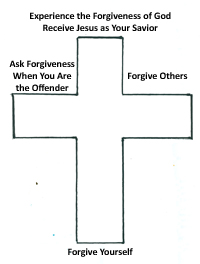 Colossians 3:13 says: “Remember, the Lord forgave you, so you must forgive others.”
Colossians 3:13 says: “Remember, the Lord forgave you, so you must forgive others.”
For the past couple of weeks, I have been writing on Forgiving Others; explaining the reasons why, as well as the misconceptions we sometimes have about what forgiving others means.
In my post last week, I pointed out five misconceptions that sometimes become stumbling blocks that keep us from passing on the forgiveness that Christ has given us to others.
You can read them in detail here. Just briefly those misconceptions were:
- I Don’t Feel Like Forgiving
- They Are Not Sorry They Hurt Me
- Forgiveness verses Reconciliation
- Forgiving and Forgetting
- They Don’t Deserve to be Forgiven for the Way They Treated Me
Today, I want to list 5 more misconceptions in the hope that we can dispel those ideas by throwing them in the garbage can, as Hannah has illustrated, and begin to live in freedom.
1. Time Heals All Wounds
Have you seen people replay events that took place years and years ago, along with the bitterness and anger toward the people they feel caused them the hurt? If time within itself healed, one would think “umpteen” years would be enough time.
Dr. Phil McGraw says it like this: “Time does not heal all wounds; it’s what we do with time that heals.”
I believe what he is saying is that there must be an active participation with time. Working through the anger caused by the hurt, and choosing to forgive paves the way to healing.
May we use our time wisely, so that our convalescent period from a wounded heart is shorten.
2. Forgiveness is Not Ceasing to Feel the Pain
When we make the choice to forgive, that does not mean that the pain of the hurt magically disappears. I personally believe that in making the choice to forgive, the process of healing does begin, but the pain does not go away overnight.
Some of you have had horrible things done to you. It would be so cruel of me to say, “Well, if you’ve forgiven them, it shouldn’t hurt anymore.”
Let me try to connect the dots and explain it this way: Suppose you had a very bad wound on your arm. The doctor may bandage the wound, prescribe antibiotics to keep infection down, or it some cases, he might decide surgery is needed.
Whatever method is used, it takes time for the wound to completely heal, and the pain does not magically disappear, no matter what method the doctor chooses to use. However, leaving the wound open on your arm would damage it more.
I see that as the way it is with forgiveness. Choosing to forgive does not cause the pain to disappear overnight; but leaving the wound open only brings about more opportunities for bitterness to come in and stir up infection in the heart.
3. Forgiveness is Not a Green Light for Trusting
This is where the rubber meets the road, so to speak. Surely you heard or even experienced stories like these:
- “My dad molested me. He said he’s sorry. Can he babysit my kids?” Answer: “No way!”
- “My boyfriend or husband hit me, but he said he’s sorry. Should we just pick up where we left off and keep going?” Answer: “No way.”
You see, trust must be built slowly over time. Some people can and should be trusted in time if they have repented and gotten help. Other people should never be trusted again because the risk is simply too high. This is particularly true with children who are vulnerable. We need to be careful with whom we trust.
So, how can we apply this to forgiveness? My friend and mentor, the late Melba Berkeheimer said it this way: “I had a very close friend whom I confided deep personal things to, only to find out that she had told other people the things I had confided to her. As a Christian, I knew I was to forgive her, but what was I to do about this friendship?”
Melba goes on to say how the scripture in Matthew 5:38-39 answered her question as to what she felt she must do in regard to forgiveness vs. retaliation. “You have heard that it was said, ‘An eye for an eye and a tooth for a tooth. But I tell you not to resist an evildoer. On the contrary, whoever slaps you on the right cheek, turn the other to him as well.” (ISV)
Melba concluded that: “I forgive you on this side of my cheek, but on the other side of my cheek, I will never tell you anything else, and you will no longer be my close friend.”
Forgiveness was given, but trust was lost, and measures had to be taken to ensure that the event never happened again.
4. Forgiving is Not Enabling
The story in 1 Samuel 2:27-29 of how Eli looked the other way as his sons sinned against the Lord is an example of enabling.
Eli was head priest and was given charge over the Tabernacle. His sons were scoundrels who would take the best of the offerings for themselves, and if the worshipers complained, they would take it by force. They were also seducing the young women who served at the entrance of the tabernacle.
Eli was aware of his sons’ behavior, and confronted them; however, he continued to allow his sons to serve as priests. Eventually Eli lost his priesthood, his sons died, and God placed restrictions on the entire family.
I conclude that:
- You can forgive someone without enabling their sin. If you have a friend or a family member who is an addict, for example, you can forgive them without enabling them in their addiction.
- Forgiving can even include confronting and rebuking, and sometimes it must. As in the case with Eli, he confronted, but he did not follow through; thereby enabling his sons to continue in their sins.
5. Forgiveness and Final Justice
By now, you might be saying: “But if I forgive them, where’s the justice?”
Justice comes ultimately from Jesus. Either the one who hurt you will come to faith in Christ and you will get your justice at the cross, where Jesus’ blood was shed in their place for their sins as it was for your sin.
Or, if they remain unrepentant, your forgiving them does not mean that they are off the hook by our Lord. They’ve sinned against you and God, but as you forgive them, you’re leaving them to Jesus.
If they live in a state of unrepentance and they don’t come to Jesus for forgiveness, they will stand before Jesus in the end, paying their eternal debt to the living God.
So, in forgiving someone, we are not neglecting justice. We’re leaving it to the perfect judge to enact perfect justice. And we forgive in light of that.
I probably could list more misconceptions, and perhaps you might have other questions. These are the ones that I am most familiar with, so I will leave it at that.
On a personal note, having taught classes on The Grieving Process for many years, I got a close up view of the pain and hurt that can be inflicted by others. I also got a close up view of the struggle good people sometimes have as they dealt with the hurt, along with forgiveness.
May I say that in the scope of the big picture, I believe with all my heart that we do have to pass on forgiveness. I think it is like a magnet. When we don’t forgive, we will be drawn back to that person and the circumstances surrounding them and we cannot go forward.
However, in saying that, how well I know that there are those people who would want to press the issue of forgiveness with a hurting person before they are ready, thus putting a guilt trip on an already badly wounded person.
To that I say, just look over them. I am sure their intentions are good, but their timing is out of line. Remember that the Lord sees where you are in the process and will gently guide you to the very time and place when He knows you are ready to forgive. To that I say, “please don’t resist His gentle nudge.”
Join Hannah and me next week as I tell my own personal story on “How to Bless Your Enemies:” a step I refer to as Beyond Forgiveness.










